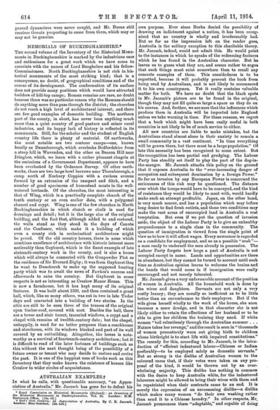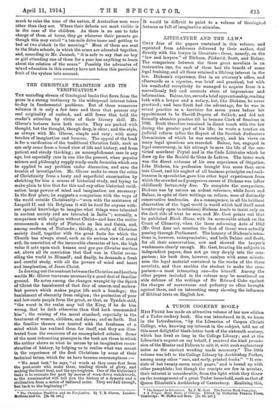AUSTRALIAN EXAMPLES4 IN what he calls, with questionable accuracy, "an
Appre- ciation of Australia," Mr. Jacomb has gone far to defeat his
• n.we Commission on Historical Monuments (England) an rnaentory Ilistosieal Monuments in Buckinghamshire. 'VoL H. London: B. Stationery Office. Res. OL] amrs Ou-n Country:on Appreantion of Australia. By C. B. Jacomb. I.oudon Man aoka... netA own purpose. Ever since Burke denied the possibility of drawing an indictment against a nation, it has been recog- nized that no country is wholly and irredeemably bad. But so far as the impression left on the reader goes, Australia is the solitary exception to this charitable theory. Mr. Jacomb, indeed, would not admit this. He would point to the instances in which he speaks of the redeeming features which he has found in the Australian character. But he leaves us to guess what they are, and seems rather to argue that such things most exist somewhere than to recall any concrete examples of them. This onesidedness is to be regretted, because it will probably prevent the book from being read by Australians, and is not likely to recommend it to his own countrymen. Yet it really contains valuable matter for both. We have no doubt that the black spots in Mr. Jacomb's picture are to be found in the original, though they may not fill quite so large a space as they do on his canvas. And, further, we are sure that the influences which produce them in Australia will be imported into England unless we take warning in time. For these reasons, we regret that a book which might have been really useful in both countries is not likely to be of much service to either.
All new countries are liable to make mistakes, but the Australians stand almost alone in their anxiety to remain a small community in a vast continent. "In time everything will be grown there, but there must be a large population." Of late this necessity has been recognized to some extent. But the recognition has been partial and grudging. The Labour Party has steadily set itself to play the part of the dog-in- the-manger. Mr. Jacomb attacks this policy on the ground that it exposes Australia to the "ever-increasing danger of occupation and subsequent domination by a foreign Power." So far as invasion by any European Power is concerned the seriousness of this risk may be questioned. The distance over which the troops would have to be conveyed, and the kind of resistance they would be likely to meet with, would hardly make such an attempt profitable. Japan, on the other band, is very much nearer, and has a population which may before long desire to find fresh outlets, and these two conditions may make the vast areas of unoccupied land in Australia a real temptation. But even if we put the question of invasion aside, the object of the Labour Party is to give an unhealthy preponderance to a single class in the community. The question of immigration is viewed from the single point of view as to bow it will affect wages. Every newcomer is regarded as a candidate for employment, and so as a possible " scab"— a man ready to undersell the men already in possession. The Labour Party forgets bow large a part of Australia is not occupied except in name. Lands and opportunities are there in abundance, but they cannot be turned to account until such time as Australian opinion learns to welcome the brains and the hands that would come in if immigration were really encouraged and not merely tolerated.
Mr. Jacomb gives a very unfavourable account of the position of women in Australia. All the household work is done by the wives and daughters. Servants are not only a very costly luxury ; they are usually so inefficient as to be little better than an encumbrance to their employers. But if the wife gives herself wholly to the work of the house, she Boon becomes a mere drudge, and in that character she is not likely either to retain the affections of her husband or to be able to give her children the training they need. If white women "toil relentlessly through the Australian summer . . . Nature takes her revenge," and the result is seen " thousands of women prematurely worn out giving birth to children whose birthright is to start life with impaired constitutions." The remedy for this, according to Mr. Jacomb, is the intro- duction of "efficient indentured labour—Chinese or Indian preferably—to be employed solely as domestic servants." But so strong is the dislike of Australian women to the coloured races that, if their votes were taken on any pro- posal of the kind, it would be thrown out by an over- whelming majority. This dislike has nothing in common with the desire to keep Australia white, for the indentured labourers might be allowed to bring their wives with them and be repatriated when their contracts came to an end. It is merely the expression of an unreasoning dislike—a dislike which makes many women "do their own washing rather than send it to a Chinese laundry." In other respects, Mr. Jacomb pronounces them "adaptable," and capable of doing
much to raise the tone of the nation, if Australian men were other than they are. Where their defects are most visible is in the case of the children. As there is no one to take charge of them at home, they go wherever their parents go, though this may entail "a ten-mile drive home and getting to bed at two o'clock in the morning." Most of them are sent to the State schools, in which the sexes are educated together, and, according to Mr. Jacomb, "it is safe to say that no boy or girl attending one of them for a year has anything to learn about the relation of the sexes." Possibly the advocates of mixed education in this country have not taken this particular fruit of the system into account.







































 Previous page
Previous page